After a poor experience while still in high school at the Montreal Canadiens training camp, Kennedy returned home and played one season of senior hockey for the Port Colborne Sailors, averaging a goal per game as well as 52 points in 23 games. Toronto then arranged a trade for Kennedy's rights from Montreal before he joined the Toronto Maple Leafs for a pair of games in the 1942-43 season. To this day, the trade is viewed as both one of the best in Toronto history and, as recently as 2001, called "one of the five darkest days in Canadiens history."
During his first full season with the Maple Leafs, Kennedy impressed with 49 points in 49 games, which included 26 goals while impressing the fans with his determination, toughness and playmaking skills, especially as Toronto had lost several key players to the armed forces during World War II.
Kennedy, born on this date in 1925, then led the team in scoring during the 1944-45 season with 29 goals and 54 points in 49 games. Although Toronto finished third in the six team NHL, 28 points back of the Montreal Canadiens and their 38-8-4 record, Toronto eliminated their Canadian rivals in six games of the opening round of the playoffs and then defeated the Detroit Red Wings in seven games to win the 1945 Stanley Cup championship as Kennedy scored 7 goals and 9 points in 13 games to lead the Maple Leafs in playoff scoring.
The following season of 1945-46 was a lost one for Kennedy, as a slow start, illness and a season ending injury led to a dismal 21 games played with a mere 5 total points. His luck changed before the start of the 1946-47 season when no less than Charlie Conacher himself presented Kennedy his number 9 sweater. When Kennedy arrived in Toronto, Lorne Carr was in possession of #9, with Kennedy first wearing 12. He then changed to 10, but when Carr announced his retirement, Kennedy immediately wrote to Maple Leafs management requesting his desired #9. Not only did the team give him permission to change to 9, the arranged for Conacher to personally present it to Kennedy.
With World War II having ended in 1945, many of the NHL's missing star players returned to the league, and Kennedy felt he had to re-establish himself as an NHLer, especially after his lost season of 1945-46. His concerns were unfounded, as he went out and led the team in goals with 28, assists with 32 and subsequently points with 60, which was good for fifth overall in the NHL. Not content with that, Kennedy then led the Maple Leafs in playoff scoring with 9 points in 11 games as they defeated Detroit in five and Montreal in six to claim the 1947 Stanley Cup, with Kennedy setting an NHL record which still stands as the youngest player to score a cup winning goal.
Early in the 1947-48 season, Toronto loaded up for another cup run by making one of, if not the largest trades in NHL history up to that point by sending five players to Chicago for the NHL's reigning scoring champion Max Bentley. Despite Bentley's resume, he was the Maple Leafs third line center behind team captain Syl Apps and Kennedy and the trio finished 1-2-3 in team scoring, with Apps leading with 53 points in 55 games over Bentley's 48 and Kennedy's 46. The tables were turned in the postseason, as Kennedy led the club with 14 points from 8 goals and 6 assists over Bentley (11 points) and Apps (8) as the Maple Leafs needed just 9 games to win their second consecutive Stanley Cup, defeating the Boston Bruins in five followed by a sweep of Detroit in the final.
During the celebrations of their championship back in Toronto, Maple Leafs owner Conn Smythe announced that Kennedy would become the next team captain, replacing the retiring Apps.
"To share that honor with Syl Apps, a superb player and perfect gentleman, was a great moment. When I replaced him as captain in '48, it was the proudest moment of my life," Kennedy later reflected.
The 1949-50 season saw Kennedy register his fifth 20 goal season on his way to 44 points, just one point back of Sid Smith for the team lead. In the playoffs, Detroit finally got the best of the Maple Leafs by defeating them 1-0 in overtime of Game 7 to end Toronto's unprecedented run of Stanley Cup success.
Kennedy saw his goal total dip below 20 in 1950-51, but he nevertheless set a career high with 61 points thanks to a league leading 43 assists in 63 games. During the playoffs, as was seemingly their annual custom, Toronto defeated Boston 4 games to 1 to advance to face the rival Canadiens. In one of the most remarkable finals in Stanley Cup history, every one of the five games went to overtime, with Toronto taking Games 1, 3, 4 and 5 to win their fourth title in five seasons and fifth of Kennedy's career.
On October 13, 1951, the Maple Leafs and Chicago Black Hawks played an afternoon hockey exhibition prior to their regularly scheduled game later that evening for Princess Elizabeth, the future Queen of England. Toronto team captain Kennedy represented the players greeted the Princess at the game and was quoted as saying, "Here's a kid from the little village of Humberstone, Ontario being presented to the Queen."
Kennedy's 52 points were again good for second place in team scoring in 1951-52. The following season he missed two months of the season due to a separated shoulder and subsequent surgery, but returned before the season was over to eventually play in 43 of the now 70 game schedule. Despite missing 27 games, Kennedy finished second in team scoring to Smith by a mere two points.
After scoring just 38 points in 1953-54, Kennedy announced his plans to retire, but owner Smythe was having none of that and offered his team captain "the highest offer ever made to a hockey player", but Kennedy insisted "he hadn't produced in proportion to what he's been paid," but Smythe won out and Kennedy returned for the 1954-55 season. Kennedy rebounded with 52 points in 1954-55 thanks to 42 assists, third most in the NHL that season.
At the conclusion of the season, Kennedy was named the winner of the Hart Trophy as the NHL's Most Valuable Player, as much in acknowledgement of his career accomplishments, as he was only the second Hart winner to not finish in the top ten in league scoring.
After the Maple Leafs were eliminated from the playoffs, Kennedy announced his retirement, but after sitting out the 1955-56 season, Kennedy returned to play half of the 1956-57 season to try to help the Maple Leafs who were shot on players due to injuries and had won just once in their previous 11 games. Kennedy scored 22 points in 30 games, but it was not enough to help the club make the playoffs.
Kennedy finished his career with 696 games played, 231 goals and 329 assists for 560 points, a Hart Trophy and five Stanley Cups, the most of any player at the time of Kennedy's retirement. Kennedy was inducted into the Hockey Hall of Fame in 1966 and had his #9 honored by the Maple Leafs on October 3, 1993.
Upon his passing in 2009 at the age of 83, Toronto General Manager Brian Burke paid tribute to Kennedy by saying "He truly was a man of great class and he was one of the most accomplished leaders in our team's long history."
Today's featured jerseys is a 1950-51 Toronto Maple Leafs Teeder Kennedy jersey as worn during Kennedy's career high 61 point season when the Maple Leafs won the fifth Stanley Cup of his career.
The Maple Leafs first wore this style jersey back in 1934-35 with a slightly different crest. The crest seen on today's featured jersey arrived in 1938-39, and other than a change to red lettering from 1945-46 to 1947-48, remained the same throughout Kennedy's entire career. This exact style remained in used through 1957-58 until a lace-up collar was added. Finally, after essentially wearing the same design for 32 years, a new jersey debuted in 1967-68 with a new, modernized logo and Northwestern striping pattern.
Toronto returned to this basic template in 1992-93 and it remains in use to this day.
Bonus jersey: Today's bonus jerseys is a 1946-47 Toronto Maple Leafs Teeder Kennedy jersey from early in his career even before he was named as an assistant team captain. The Maple Leafs would win the Stanley Cup in 1947, Kennedy's second championship at the young age of just 21.
Today's video section is the excellent Legends of Hockey profile of Kennedy.

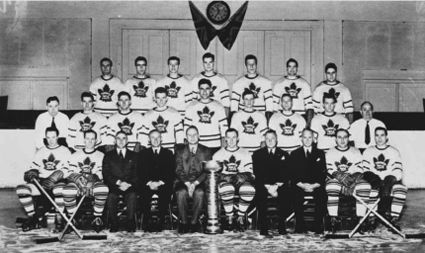
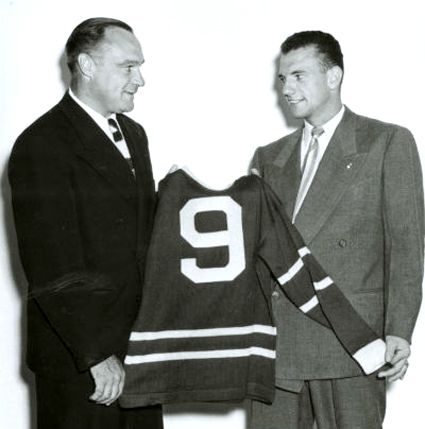
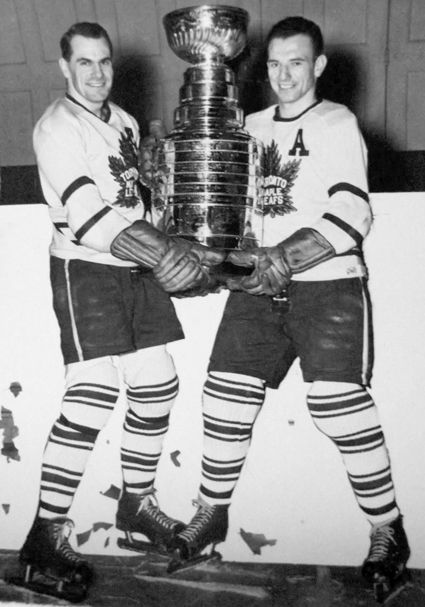
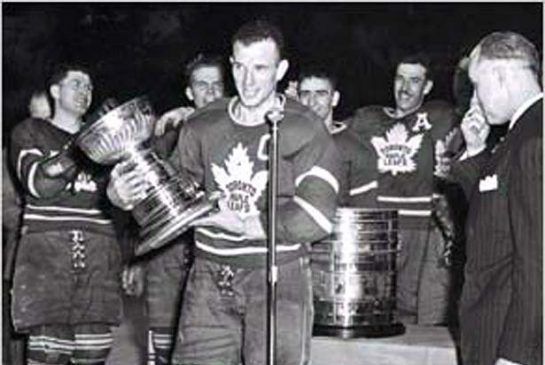
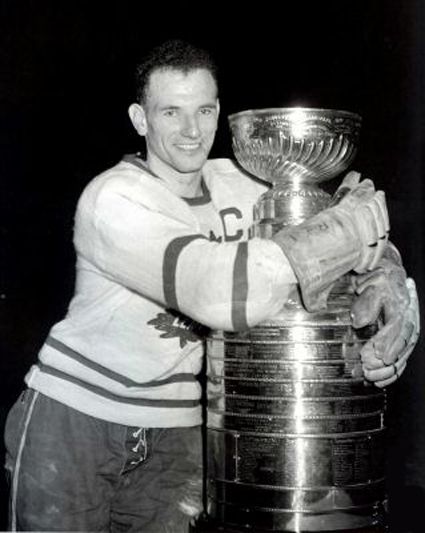
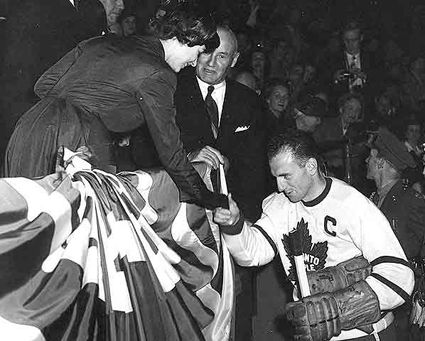
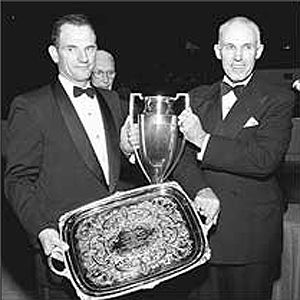
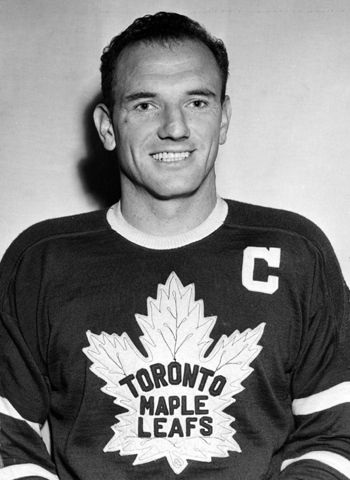
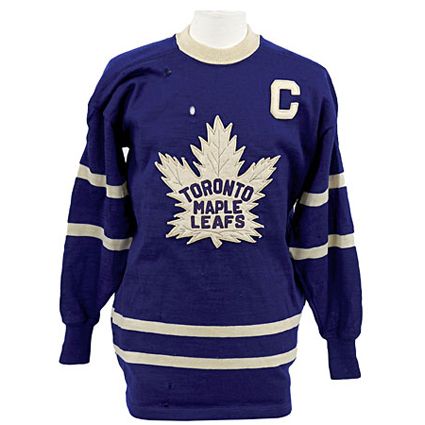
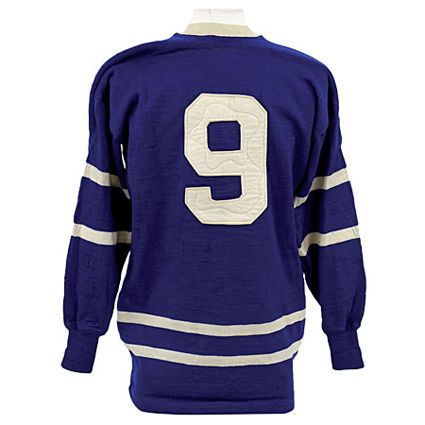
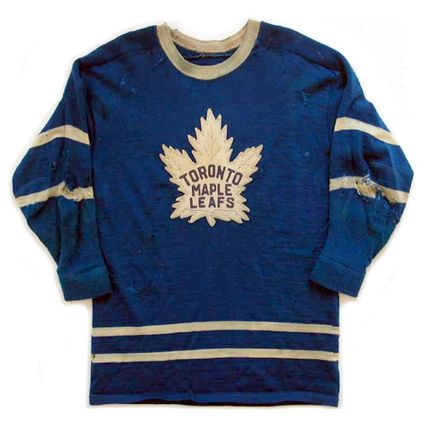
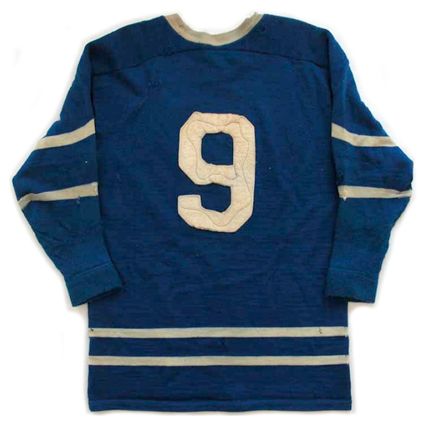










No comments:
Post a Comment
We welcome and encourage genuine comments and corrections from our readers. Please no spam. It will not be approved and never seen.